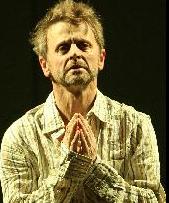SITE GUIDE
SEARCH
REVIEWS
REVIEW ARCHIVES
ADVERTISING AT CURTAINUP
FEATURES
NEWS
Etcetera and
Short Term Listings
LISTINGS
Broadway
Off-Broadway
NYC Restaurants
BOOKS and CDs
OTHER PLACES
Berkshires
London
California
New Jersey
DC
Philadelphia
Elsewhere
QUOTES
TKTS
PLAYWRIGHTS' ALBUMS
LETTERS TO EDITOR
FILM
LINKS
MISCELLANEOUS
Free Updates
Masthead
Writing for Us
A CurtainUp Review
Beckett Shorts: "Act Without Words I," "Act Without Words II," "Eh Joe," & "Rough For Theatre I"
|
Why don't you kill yourself? Why don't you kill yourself? — B I have thought of it. . . I am not unhappy enough. — A From "Rough For Theatre I" |

Mikhail Baryshnikov
(Photo: Joan Marcus) |
All four plays are brilliantly directed by Joanne Akalaitis, star Mikhail Baryshnikov and feature incidental music by the experimental and edgy composer, Philip Glass. Mirit Tal's video projections and Alexander Brodsky's spare but searing sets contribute enormously in creating the surreal atmosphere so necessary for making The "Act Without Words" piecesare pantomimes. Beckett, who loved the world of the circus clown, shines brightest and speaks most effectively in the space of these silences.
In "Act Without Words I", Baryshnikov is thrown onto a desert Island. A tree falls into place. A jug of water descends to a height just beyond his reach. The pantomime becomes a Chaplinesque charade about the futility of action and the impossibility of salvation as Baryshnikov, ever lithe and supple, climbs on boxes and shimmies up a rope in an attempt to reach the jug of water. Overcome with frustration, the man contemplates suicide. Even that relief is denied him.
In "Act Without Words II", Baryshnikov and another actor, David Neumann, lie under blankets on a narrow platform. A spear rolls slowly onto the stage and stops just before it can pierce either of the men. First Baryshnikov gets out of his blanket. He puts on a coat and pants, eats a carrot and spits it out, swallows some pills, prays, tries to wake the other man and gets back under the blanket. Then Neumann does essentially the same thing, only he appears, for a while, much more successful and self-assured. He looks at his watch and what could be a timetable or a map. He doesn't spit out the carrot. He has no need of prayers or pills. But he too ends up back under the blanket.
"Rough For Theatre I" features Baryshnikov as a blind fiddler and Bill Camp as a one-legged cripple. The two men meet some place or no place. They talk about life and death, suicide and the reason they go on living. For a short while, they seem to soothe each other's pain, but eventually their attempt to reach out to each other proves futile. It seems probable they will part and go off in their separate and bitter ways.
In "Eh Joe", Baryshnikov's face is seen close-up on a screen, while the man himself sits behind the screen on a bed. Smaller images of Baryshnikov are projected on another screen upstage. A woman (the formidable Karen Kandel) berates him, making Joe come to terms with his life, his mistakes, his failures and his lost love.
Becket Shorts is riveting, moving and disturbing. All the elements — sound and music, video and set — fit together like a completed puzzle. Baryshnikov succeeds in putting all the emotion into his face while acting that he puts into his body while dancing. The other three actors Camp, Neumann and Kandel, are every bit as effective in their equally essential roles.
Despite occasional bursts of humor, however, these four plays are hardly entertaining— unless one can find entertainment in the perfection of the staging and the performances. The evening fills one with dread, unmitigated by even the faintest hope. For those who love Beckett, this production fills every expectation. For those unfamiliar with the playwright, they are an excellent introduction. But don't expect to leave smiling.
Editor's Note: "Eh Joe" has been reviewed twice at Curtainup, the first time next door to the New York Theater Workshop, and most recently in London. Eh Joe - London 2006 and Eh Joe at the Kraine Theater, 2000
| BECKETT SHORTS By Samuel Beckett Directed by JoAnne Akalaitis ACT WITHOUT WORDS I Mikhail Baryshnikov (Man) . ACT WITHOUT WORDS II Mr. Baryshnikov (A) and David Neumann (B) ROUGH FOR THEATER I Mr. Baryshnikov (A) and Bill Camp (B). EH JOE Mr. Baryshnikov (Joe) and Karen Kandel (Woman). Music by Philip Glass Sets by Alexander Brodsky Costumes by Kaye Voyce Lighting by Jennifer Tipton Sound by Darron L. West Video by Mirit Tal Running time: 1 hour 15 minutes New York Theater Workshop, 79 East Fourth Street, East Village; (212) 239-6200. From 12/05/07; opening 12/18/07; closing 1/20/08. Tuesday at 7:00pm, Wednesday through Friday at 8:00pm, Saturday at 3:00pm and 8:00pm, and Sunday at 2:00pm and 7:00pm. Reviewed by Paulanne Simmons 12/20/07 |
Try onlineseats.com for great seats to
Wicked
Jersey Boys
The Little Mermaid
Lion King
Shrek The Musical

The Playbill Broadway YearBook

Leonard Maltin's 2007 Movie Guide


Wicked
Jersey Boys
The Little Mermaid
Lion King
Shrek The Musical

The Playbill Broadway YearBook

Leonard Maltin's 2007 Movie Guide


